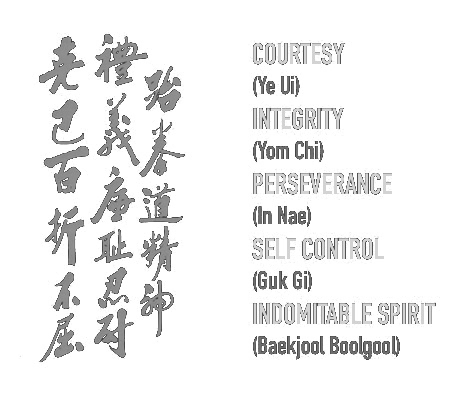Taekwondo

HISTORY
Taekwondo literally means “the way or art of the foot and fist,” and modern taekwondo started to emerge in the late 1940’s after Korea was liberated from Japan’s occupation. When Japan occupied Korea, anything that represented “Korea” was forbidden; Masters went underground or were exiled to China or Japan. When Korean Masters returned to Korea after the end of World War II, they returned with martial arts techniques from other countries; these techniques became infused into Korean martial arts. This gave Korean taekwondo its unique style of open and closed hand strikes, various holds and grappling techniques, and its fantastic kicking style.
Decades ago, the Masters made heroic sacrifices to keep Korean martial arts from being eradicated; therefore, the respect for its history and traditions must always be taught and honored.
TRADITION
There are five universally accepted tenets of taekwondo: Courtesy, Integrity, Perseverance, Self-Control, and Indomitable Spirit. These five tenets serve as the basis for the very foundational traditions of taekwondo. It would be a disservice to the student not to include these five tenets into their taekwondo training program, and would inherently misrepresent the heart and soul of taekwondo. Master Taekwondo’s training program adheres to the taekwondo traditions and requires each student to apply these five valuable tenets to their lives.
Five Tenets
#1. Courtesy – Students will show courtesy to all others in the dojang, as well as people they meet outside of their formal training.
Younger students will address adults as “Sir” or “Ma’am.”
Students will bow to the American and S. Korean flags upon entering and exiting the dojang.
#2. Integrity – Students are expected to be honest and be willing to exhibit strong moral principles that will help them distinguish between right and wrong.
#3. Perseverance – Students must remember that they will never grow stronger by engaging their doubts. Therefore, students should be willing to confront their fears, battle back against their struggles, and never look for short-cuts when achieving their goals.
#4. Self-Control – Students are expected to keep their emotions (thoughts and actions) in-check at all times, both inside and outside the dojang.
Punctuality is essential because all classes start promptly at the designated times.
Students are expected to keep the dojang clean and tidy.
#5. Indomitable Spirit – Students will consistently exhibit a full 100% effort in all they do inside and outside the dojang.
Students must show courage when standing up for their beliefs and convictions inside and outside the dojang.

Thanks for contacting us!
We will be in touch shortly.If you contacted us outside of business hours it might take us a bit longer to respond.
Special
Thank you for submitting!
A team member will be in contact with you as soon as possible!
